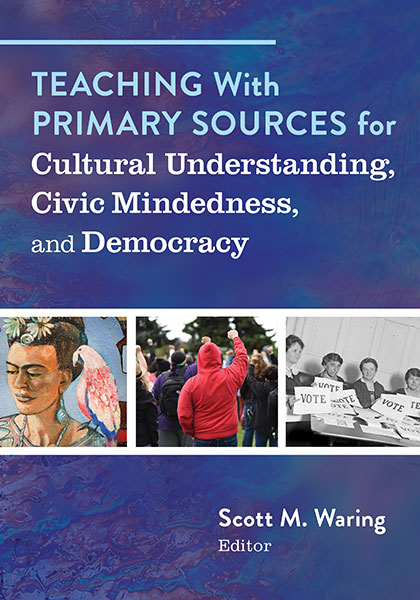Professors: Request an Exam Copy
Print copies available for US orders only. For orders outside the US, see our international distributors.
Edited by: Scott M. Waring
Publication Date: March 22, 2024
Pages: 272

This resource has been developed for preK–20 educators in order to help students use primary sources to go beyond simple acquisition of content knowledge and rote memorization. The procedures and approaches outlined in this book are designed to help students use primary sources in discipline- and inquiry-based ways to develop and enhance cultural understanding, civic mindedness, and democracy. Expert authors demonstrate how the skills students learn through this process can be applied to their everyday life and allow them to think critically about the world around them, better understand various cultures, communicate their understandings effectively, and enhance their democratic values. Grounded in the National Council for the Social Studies C3 Framework, topics include social emotional learning, inclusion, higher order thinking, civic agency, project-based learning, democracy-building across cultures, teaching about war, enacting change through intentional civic engagement, and systemic racism in the United States.
Book Features:
Scott M. Waring is a professor and program coordinator for the Social Science Education Program at the University of Central Florida. His books include The Educator's Handbook for Teaching With Primary Sources, Integrating Primary and Secondary Sources Into Teaching: The SOURCES Framework for Authentic Investigation, and Conducting Authentic Historical Inquiry: Engaging Learners with SOURCES and Emerging Technologies.
“Veteran and new teachers in all levels of education will benefit from this impressive collection of classroom resources and tools. Dr. Scott Waring once again proves his determination is strong, as he continuously strives to support educators in his advocacy for the teaching and learning of history. He illuminates opportunities to use primary sources paired with content to enhance the democratic values of our students, empowering and equipping them to be engaged citizens.”
—Tammara Purdin, educator and executive director, Florida Council for History Education
Contents
1. Experiential Education as a Framework for Teaching and Learning With Primary Sources 1
Cheryl Mason Bolick
2. Activating Critical Thinking and Social Emotional Learning Through DBQ 14
Amber J. Godwin and Rebecca Wentworth
3. Inclusion of Students With Disabilities Through Primary Sources 32
Rich Cairn and Graham Warder
4. Higher-Order Thinking and Reasoning Through Primary Source Document Analysis 47
Janis Bulgren, Darren Minarik, and Jocelyn Washburn
5. Strengthen Language Proficiency Through Primary Source Inquiry: Supporting Multilingual Learners 64
Alison Noyes and Allison Audet
6. Teaching Civics With Primary Sources From the National Archives 87
Kathleen Munn
7. When the Young Lead: The Legacy of Black Youth Civic Engagement in the Struggle for Civil Rights 106
Daniella Ann Cook, Jeffrey C. Eargle, and Vernon Turner
8. Here and There: Evaluating Global Democracy-Building Through Declarations of Independence 121
Erin Bronstein, Carly Muetterties, and Julia Bromberg
9. Deepening Civic Engagement With Project-Based Learning 139
Alex Goodell, Christopher Carter, and Sara Nachtigal
10. ¡Sí, se puede!: Latinx Histories and Cultures Through Primary Sources 158
Bárbara C. Cruz
11. Teaching War Through Primary Sources: A Critical Refugee Studies Approach 175
Sohyun An
12. What Does It Mean to Be in Solidarity?: Using Primary Sources to Teach Students How to Enact Change Through Intentional Civic Engagement 190
Karen L. B. Burgard and Tina M. Ellsworth
13. Locating Culture: Teaching With Primary Sources to Advance Culturally Responsive Teaching With Multilingual Learners 214
Andrea G. Kolb
14. Graphic Memoirs as Primary Sources: Examining Racial Discrimination, Then and Now 233
Jeremiah C. Clabough and Caroline C. Sheffield
Endnotes 251
Index 253
About the Editor and Contributors 263
Professors: Request an Exam Copy
Print copies available for US orders only. For orders outside the US, see our international distributors.